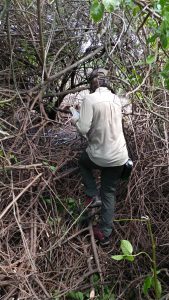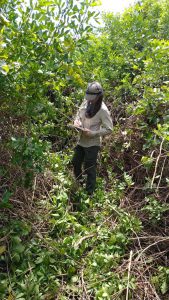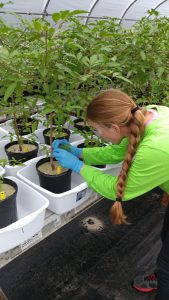By Katie Ray, UF/IFAS Center for Aquatic and Invasive Plants (CAIP) Intern

Originally from Palm Desert in southern California, Mackenzie Bell is a graduate research assistant at the UF/IFAS Center for Aquatic and Invasive Plants. Mackenzie’s thesis surrounds improving Brazilian Peppertree (Schinus terebinthifolia Raddi) management through novel application techniques aiming to reduce herbicide output and improve worker safety. Mackenzie began her education majoring in Biology and minoring in Sustainability at San Diego State University. She spent her final year of undergrad studying abroad in Melbourne, Australia at Deakin University. Currently, Mackenzie is majoring in Agronomy at the University of Florida, specializing in Invasive Plant and Science Management.
While studying in Australia, Mackenzie became interested in invasive species while experiencing the unique landscapes and wildlife of Australia. In 2016, Mackenzie moved to Florida to learn more about invasive species. The next year, Mackenzie worked for Paynes Prairie Preserve State Park. Through her work at Paynes Prairie, Mackenzie realized the importance of managing invasive species.
“Through this AmeriCorps experience I fell in love with Florida’s unique beauty and grasped the importance of managing invasive plants to protect the natural biodiversity that exists here,” Mackenzie said.
Mackenzie was introduced to Dr. Enloe’s lab through outreach in Plant Camp.

“I attended Plant Camp as a speaker in 2017 during my year with Florida Conservation Corps, a branch of AmeriCorps that works with Florida State parks to remove invasive plants and participate in public outreach and education,” Mackenzie said. “Plant Camp offered a view into the fantastic work going on at the Center for Aquatic and Invasive Plants. It just worked out that I met Dr. Ferrell and Dr. Enloe at the right time and place that I was offered a graduate research assistantship.”
Brazilian peppertree (SchinusterebinthifoliaRaddi) has been the focus of Mackenzie’s research during her time in Dr. Enloe’s lab. According to Mackenzie, Brazilian peppertree is an invasive plant from Brazil, Argentina and Paraguay. Broughtto Florida as an ornamental in the 1800’s, Brazilian peppertree escaped cultivation and is currently threatening sensitive habitats in Florida. The invasive has become a costly issue for the state of Florida.
“It invades more than 700,000 acres of Florida and is extensively managed by multiple agencies, costing millions of dollars annually,” Mackenzie said. “Its multi-stemmed nature makes it an exceptionally difficult species to manage and with our current management practices there is a need to reduce the amount of herbicide required to control this species.”
This past semester, a typical day for Mackenzie has not been too exciting, but it has been busy. Mackenzie has been preparing her thesis for defense, as she prepares to graduate this December.


“Graduate school is a balance. On one hand, you take on multiple projects therefore getting out into the field is essential,” Mackenzie said. “On the other hand, you have full class loads, conferences to prepare for, and eventually manuscripts to write. Our field work is often boom and bust, fitting in as much work as possible in spurts of weeks when you have the free time, for example during summer, and then taking the time to sift through the data and spending time indoors.”
When she’s not researching new ways to manage invasive plants or defending her thesis, Mackenzie can still be found outdoors. During her free time, Mackenzie enjoys rock climbing, birdwatching, biking, hiking and participating in citizen science, such as the Santa Fe River Turtle Research Project. Although Mackenzie’s graduation is imminent, she will continue to be passionate about the research she has conducted.
“I am surrounded by grad students and professionals who are passionate about their work and excited to share what they have learned,” Mackenzie says. “This experience goes above and beyond what I could’ve asked for in university and I am grateful to have had the opportunity to be a part of this community at the Center for Aquatic and Invasive Plants and the University of Florida.”
Funding graduate student research students is one of the many goals of UF/IFAS CAIP. Any questions should be directed to Shelby Oesterreicher at 352-273-3667 or soesterreicher@ufl.edu. For more information about the UF/IFAS Center for Aquatic and Invasive Plants please visit https://plants.ifas.ufl.edu. Be sure to follow us on social @UFIFASCAIP.
UF/IFAS CAIP, Turning Science Into Solutions.
 0
0
